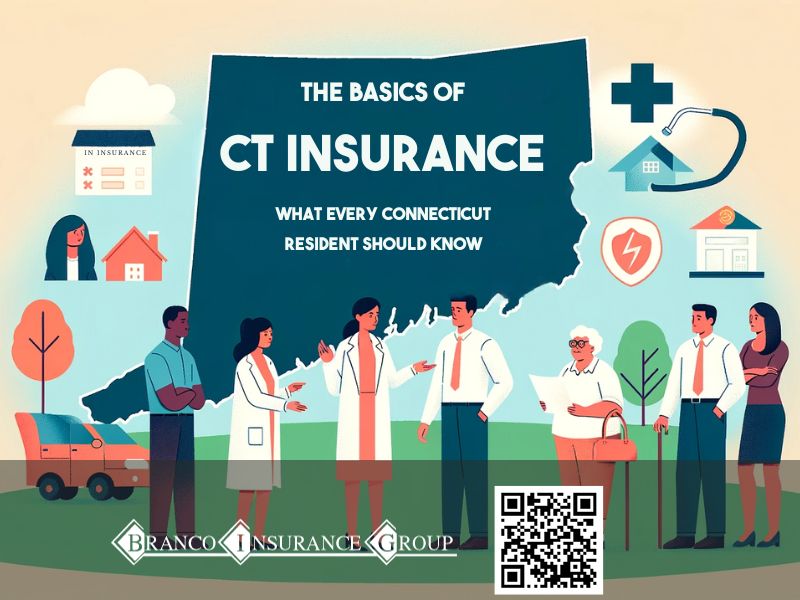
Tips to Prevent Medicare Fraud
Con artists may try to get your Medicare Number or personal information so they can steal your identity and commit Medicare fraud. Medicare fraud results

Insurance is an important topic for Connecticut residents to understand. This comprehensive guide covers the fundamentals of key insurance types like health, auto, home, and life, along with tips for getting coverage and making claims in the Constitution State.
Insurance provides financial protection against unexpected losses. By paying a monthly or annual premium, policyholders transfer risk to an insurance company. The insurer pools premiums together to pay claims if an insured event happens.
There are a variety of insurance policies for individuals and businesses, covering health, vehicles, property, liability, and more. Key elements of insurance include:
Now let’s explore major insurance types Connecticut residents need to know about.
Insurance helps safeguard your finances by transferring risk to an insurance company in exchange for a premium payment. Major types include health, auto, home & life.
Connecticut requires drivers to carry a minimum of $25,000 per person and $50,000 per accident in bodily injury liability coverage. Uninsured motorist coverage is also mandatory.
Home insurance covers threats like fire, theft, and pipe leaks. Earthquake, flood, and sinkhole coverage requires separate endorsements or policies.
Health plans sold in CT must cover essential health benefits under the Affordable Care Act. Many residents qualify for publicly subsidized coverage through Access Health CT.
Life insurance provides income replacement to dependents when parents or breadwinners pass away. Term life is the most affordable option for pure financial protection.
Disability insurance replaces lost wages if you cannot work due to illness or injury. It helps pay bills until you can return to your occupation.
Bundling auto with home or renters insurance typically qualifies Connecticut households for multi-policy discounts.
Carefully review policy documents and don’t hesitate to ask questions. Independent agents can also help identify the right coverage.
Protecting your assets with quality insurance tailored to your situation provides peace of mind. As a Connecticut policyholder, know your coverage options and risk exposures when making insurance decisions.
Health insurance helps pay medical costs like hospital stays, doctor visits, prescriptions, and more. It prevents large medical bills from causing financial hardship if you face injuries, illnesses, or other health issues.
Connecticut residents get coverage from:
Health insurance plans sold in Connecticut must provide essential health benefits, as required by the Affordable Care Act:
✅ Ambulatory services (outpatient care)
✅ Emergency services
✅ Hospitalization
✅ Maternity and newborn care
✅ Mental health and substance abuse treatment
✅ Prescription drugs
✅ Rehabilitative care
✅ Laboratory services
✅ Preventive and wellness services + chronic disease management
Key things Connecticut healthcare consumers need to know:
Picking health coverage involves weighing tradeoffs between upfront costs (premiums and deductibles) and benefits (provider choice, lower patient cost-sharing). Things to consider:
💲 What can you afford for monthly premiums and potential out-of-pocket costs? Plans with higher deductibles have lower premiums.
🏥 Is it important for your doctors and hospitals to be in-network? Check provider networks when comparing plans.
💊 Are your prescriptions and needed health services covered? Compare formularies and benefits closely.
👪 Does the plan meet the needs of all family members covered? Consider costs, available providers, and prescription needs.
Financial help is available to make health coverage more affordable:
Auto insurance pays to repair or replace your vehicle after accidents and protects injured motorists. It also covers damage you cause to other vehicles and property.
Connecticut drivers must carry bodily injury liability coverage, property damage liability, and uninsured/underinsured motorist (UM/UIM) coverage.
Required minimum auto liability limits are:
Higher limits are recommended to protect assets if you cause an accident.
In addition to liability and UM/UIM, recommended extra auto policy coverages include:
🔥 Collision – Covers repairs/replacement if you collide with another car or object, subject to your deductible.
🔥 Comprehensive – Pays for vehicle damage from non-collision incidents like fire, flooding, vandalism, hitting a deer, etc.
🔥 Towing/rental car reimbursement – Pays for transportation costs if your vehicle can’t be driven due to a covered loss.
🔥 Accident forgiveness – Keeps your rates steady after your first at-fault accident.
Like health insurance, choosing auto coverage involves weighing premium costs against your needed protection. Where allowed by state insurance regulations, factors that impact auto premiums include:
📊 Driving + claim history
🚗 Type of vehicle
📍 Coverage limits and deductibles
🏘️ Your ZIP code
👪 Age, marital status, credit score
Discounts for low mileage, good student, defensive driver course completion, bundle with home/renters policies, etc.
Home insurance and renters insurance protect your residence and belongings from damage and loss.
Typical covered home perils include fire, lightning, theft, freezing pipes, smoke damage, falling objects, electrical surges, vandalism, and more. Additional living expenses if you can’t stay at home, liability protection, and damage from floods, earthquakes, sinkholes, or sewer/drain backups can also be added through endorsements or separate policies.
Renters insurance covers your personal property and liability exposures like water leaks, fire, theft, vandalism, and unintentional bodily injury or property damage to others. It also often includes some additional living expenses coverage. Most renters need about $30,000-$50,000 in personal property protection.
Home and renters insurance pricing consider factors like:
🔍 Claims history
🏘 Value of insured home and belongings
🧱 Home age and condition
🏠 Construction (apartment vs. single-family)
🏔 Flood/severe storm risk
⚠️ Credit score
🛡️ Selected coverage limits
🚦 Safety features like smoke/security alarms & fire suppression
👮 Neighborhood crime rates
The main purpose of life insurance is to provide financial support to your dependents if you pass away. It pays out a death benefit to your chosen beneficiaries.
The two primary policy types are:
🔷 Term life insurance – Offers pure death benefit protection for a set period, such as 10 or 20 years. Premiums are generally lower compared to cash value policies.
🔷 Whole/universal life insurance – Includes an investment component that builds cash value alongside death benefits. Premiums are typically higher to support the cash accumulation.
Key considerations when buying life insurance include:
💰 How much income do your dependents need to maintain current living standards? A common guideline is 10-15x your annual earnings.
📏 What funeral costs do you want covered?
📈 Will there be any major debts, like a mortgage, that survivors may struggle with?
👶 Do you have young kids needing support into early adulthood?
🏛 Will estate taxes impact your legacy? High net-worth individuals can use life insurance proceeds to cover taxes so heirs keep more assets.
Health, driving history, age, tobacco use, and hazardous hobbies impact life insurance rates. So does the insurer’s financial strength and customer service ratings from firms like AM Best.
Many Connecticut residents rely on their income to afford necessities and save for the future. That makes protecting your earnings with disability insurance important.
Disability insurance replaces a portion of your income if injury or illness prevents you from working. It can help pay bills until you recover and return to work.
There are two main disability insurance types:
👔 Short-term disability – Replaces 40-70% of income for up to 6 months. Some employers provide this as a benefit.
👔 Long-term disability – Individual disability policies replacing 60%+ of income for 2 years or more. This covers extended illness and serious injuries.
Because government benefits have strict eligibility criteria, many residents supplement Social Security disability income with individual LTD coverage.
Top considerations when evaluating disability insurance offerings include:
💲 Income replacement amounts and benefit terms
⌛ Waiting periods before benefits start payments
🩺 Any exclusions for pre-existing conditions
👷 Job duties and risk tolerances based on your occupation
With basics on major coverage types in our Constitution State covered, here are tips for getting the right insurance for your situation:
Assess your exposures – health conditions, teen drivers, home flood risk, career demands requiring specialty protection, etc. This helps identify must-have coverages.
Shop policies from at least three insurers. Coverages and rates can vary widely for the same person.
Insurers reward your loyalty with cuts for bundling multiple policies (home & auto), paying annually, paperless billing, defensive driver courses and more.
Review the limitations section closely to see what causes of loss are excluded. For example, every flood damage isn’t covered by a homeowners policy.
Insurers need prompt, truthful loss information to pay claims efficiently. Take photos documenting damage and save receipts for temporary lodging costs, etc. Ask about advances for immediate expenses if needed.
Complicated life situation? An independent insurance agent or broker understands different carriers’ policy options in detail. They can identify tailored solutions that cost you less in the long run.
Ready to secure coverage? Here are the suggested next steps:
📝 Create an insurance inventory listing your policy needs
📊 Get quotes from multiple carriers
⚖️ Compare plans– don’t just consider the premium
🤝 Talk to an agent to determine best-fit options
📑 Read policies closely upon receipt
⏱ Set reminders for renewal and payments
Have your vehicle info, doctor’s name, driver’s license #, VIN, and other details handy when getting Connecticut insurance quotes online or from an agent. This speeds up the process.
Stay savvy as an insurance consumer in Connecticut. Evaluate new options at renewal since rates and needs evolve. Report claims completely and promptly. And always feel empowered to ask questions and talk to regulatory agencies like the Connecticut Insurance Department if difficulties securing affordable, quality coverage arise.
As an independent insurance agency serving Naugatuck and surrounding Connecticut areas, Branco Insurance Group has the experience and carrier relationships to provide quality coverage protecting what matters most – your family, health, home, assets, and business.
We realize sorting through insurance options on your own feels daunting. That’s why our consultative agents make understanding policies simple while offering customized recommendations that meet your specific needs. No pre-packaged solutions. We listen first.
Unsure where to turn for competitively-priced homeowners, auto, business, or specialty insurance? Contact us to compare top insurers’ rates while receiving attentive, local service. Benefit from options national 800 numbers can’t match. Plus our 5-star Google ratings mean we stick by your side if claims arise.
Securing the right insurance fuels life’s pursuits without constant worry. It demands a trusted partner having your back. Let us ease the process with tailored solutions and caring support at each step. The Branco difference is peace of mind.

Con artists may try to get your Medicare Number or personal information so they can steal your identity and commit Medicare fraud. Medicare fraud results

Summer is a fun time for humans and pets, but the rising temperatures can pose risks to our furry friends. Here are some essential tips
